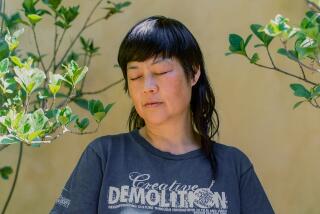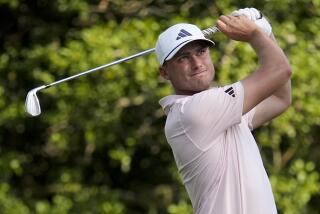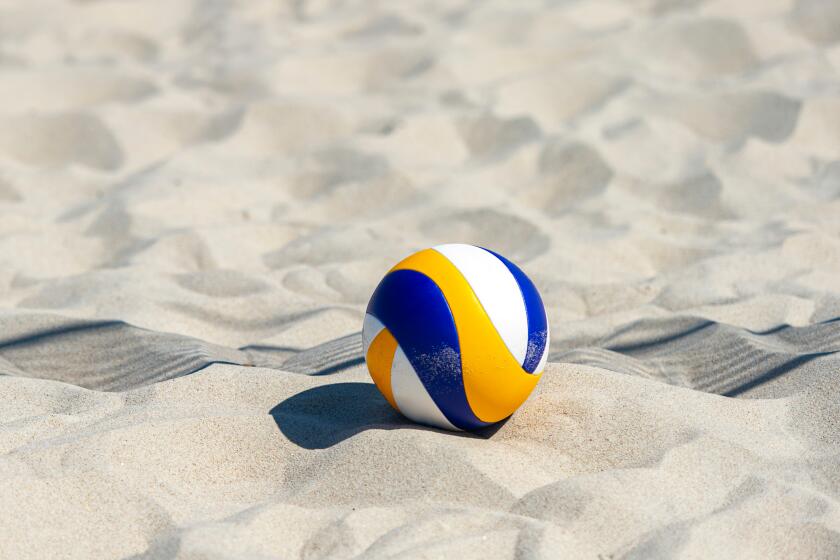Time for a Chang in Open?
- Share via
NEW YORK — If Michael Chang doesn’t win the U.S. Open now, he never will.
“This is the chance of a lifetime for Chang,” John McEnroe observed before men’s singles play continued Tuesday, knowing full well that with Pete Sampras out, it is anybody’s tournament.
He was hardly the only one thinking so Tuesday, while watching Chang’s methodical, 3-hour 41-minute conquest of Cedric Pioline, the hard-luck Wimbledon finalist. Chang went to the very brink of squandering his chance of a lifetime, which would have been a shame. A lot of people now are really pulling for Chang to win this thing.
Among them are those who wait patiently for his autograph, while Michael takes his time, using a flowing script to add “Praise the Lord” to his signature.
The tournament is his for the taking. Sampras has left the building. Boris Becker and Stefan Edberg have retired. Andre Agassi is out. Marcelo Rios, Magnus Larsson, Petr Korda, Jonas Bjorkman, Patrick Rafter, Greg Rusedski, Richard Krajicek. . . . Who’s on Court 1, What’s on Court 2 and I Don’t Know is on Court 3.
“The crowd was very helpful,” said an exhausted Chang, waving to everyone who watched him recover from 65 unforced errors and stave off defeat.
New Yorkers claim him because Chang was born right across the Hudson, in Hoboken, N.J., just like Frank Sinatra. Many here remember Chang playing in his first U.S. Open, at age 15.
Californians claim him because Chang spent his formative years in Orange County. He made a name for himself by becoming the youngest winner of the French Open--or any men’s Grand Slam event--at 17 years 3 months.
Nevadans claim him because Chang now calls the town of Henderson his home base.
And, naturally, tennis fans from Hoboken to Beijing claim him because the 25-year-old son of research chemists Joe and Betty Chang is the greatest Asian American tennis player of all time.
All the prize money Chang has accumulated includes the championship purses he has earned in places like Jakarta, Hong Kong, Osaka and Kuala Lumpur.
For 10 years, he has been one of the most prosperous and popular players on the globe.
Would he trade, say, the five other titles he has won this year for one U.S. Open title? No, Chang says.
“It would be nice, but not necessary, because I believe God has a purpose for my life. Who was it--[Ivan] Lendl?--who said he would trade everything he won for one Wimbledon? That’s not how I think. I feel I have a higher calling.”
To watch Michael flip his racket 15 feet in the air after a poor shot, or to see him utter an exclamation in disgust--probably not a profanity, knowing of Chang’s Christian beliefs--makes it obvious how much he wants to capitalize on Sampras’ surprise disappearance.
Yet if he fails to advance past Rios in the quarterfinals, it will not be a devastating defeat.
“People talk about favorites, but you really can’t expect to come out here and have a cakewalk,” he reminds everybody. “The other guys who got this far, they didn’t do it by playing mediocre tennis.”
Even so, shouldn’t Chang, ranked second in the world, be favored now?
Pioline, who came to bury Chang, not praise him, shrugs and says, “I don’t know. You have to ask him. I am not Chang.”
The Frenchman played right into Chang’s hands, as it turned out. Chang was about one unlucky bounce from holstering his racket and checking out of his hotel.
But on a sticky summer’s day in New York, when your shirt sticks to your chest like wet Kleenex, the failure to get Chang down and keep him there was one Pioline would regret. Particularly because, as Pioline put it, “I was starting cramping [sic].”
The fourth set alone took 60 minutes. Chang trailed, 5-2. If Yogi Berra had been at the match, he would have said it was over.
Pioline, however, couldn’t put Chang away.
“Not enough gas left in his tank,” Chang said of his foe.
Welcome to the club. Chang’s famous triumph over Lendl in the 1989 French Open’s fourth round took 4 hours 39 minutes. His four-setter with Andrei Chesnokov there lasted 4:05.
After 3 1/2 hours, Chang is simply getting warmed up. He once played Edberg for 5 hours 26 minutes. In the 1991 Open here, his 4 1/2-hour match with McEnroe didn’t end until 1:30 in the morning.
With Michael Chang, everything takes a little longer. Even the autographs.
Maybe it took 10 years for his U.S. Open higher calling to arrive.
More to Read
Go beyond the scoreboard
Get the latest on L.A.'s teams in the daily Sports Report newsletter.
You may occasionally receive promotional content from the Los Angeles Times.










